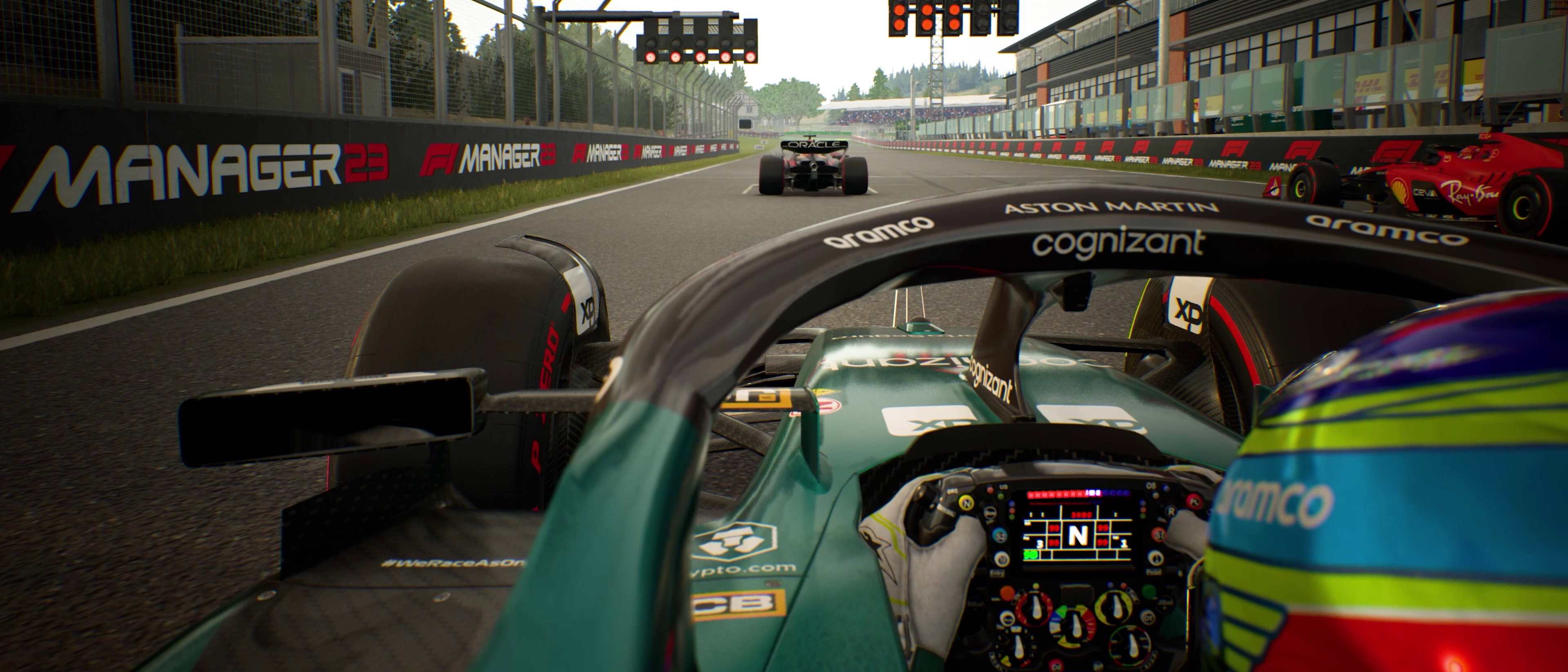TechRadar Verdict
If you’ve ever imagined you could run a race team better than F1’s team principals, give F1 Manager 23 a go. Its difficulty can be very humbling, but if you put the time in to learn its overlapping systems you’ll find an engrossing strategy game that does a fantastic job of holding your attention.
Pros
- +
Incredibly detailed strategy
- +
You’ll love it when a plan comes together
- +
Races are usually full of surprises
- +
Regular updates to match the current season
Cons
- -
Steep learning curve
- -
Some crucial options are hard to find
- -
Hands-off tutorial isn’t great for newcomers
Why you can trust TechRadar
Platform reviewed: PC
Available on: PS5, PS4, Xbox Series X|S, Xbox One, PC
Release date: July 31, 2023
F1 Manager 23 may be a game about strategy, stats and spreadsheets, but you still need the composure of one of a Formula 1 driver to play it. Yes, unlike F1 23’s brand of real-time, on-track racing, your playtime here will largely be behind the scenes, running the day-to-day management of a Formula 1 team throughout the 2023 season. But you'll still need split-second decisions and nerves of steel to get your boys on the podium. As a big fan of the motorsport, I was eager to get stuck in trying my hand at guiding my team to an eventual victory.
We kick off the opening race weekend at the balmy climes of Bahrain and its international circuit. It’s my first year as team principal for the Williams Racing team, which in recent years has found itself floundering at the back of the Constructors’ Championship. Established driver Alex Albon and rookie Logan Sargeant show bags of promise – they just need a firm hand to guide them back up to being staunch midfield contenders.
This proves to be easier said than done. You’re not exactly behind the wheel, but running a Formula One team means spinning all the plates in the background. That entails designing and manufacturing upgraded car parts, formulating pit strategies for every race weekend, ensuring your staff are happy week-on-week, improving and maintaining your facilities, and keeping the board satisfied. Falling behind in any one of these can have disastrous outcomes on the track.
But there’s a beauty in that, I feel. Most of F1 Manager 23’s systems will have an effect on another, so you’re constantly engaged in a balancing act behind the scenes to ensure your drivers have the best possible practice, qualifying, and race sessions. When it all goes to pot, you’ll be despairing and tempted to load an old save. But when everything falls into place and your strategies pay off, you’ll feel a deep sense of satisfaction. Especially so if you’re manning a backmarker team like Williams, Haas, or AlphaTauri.
Meet the team
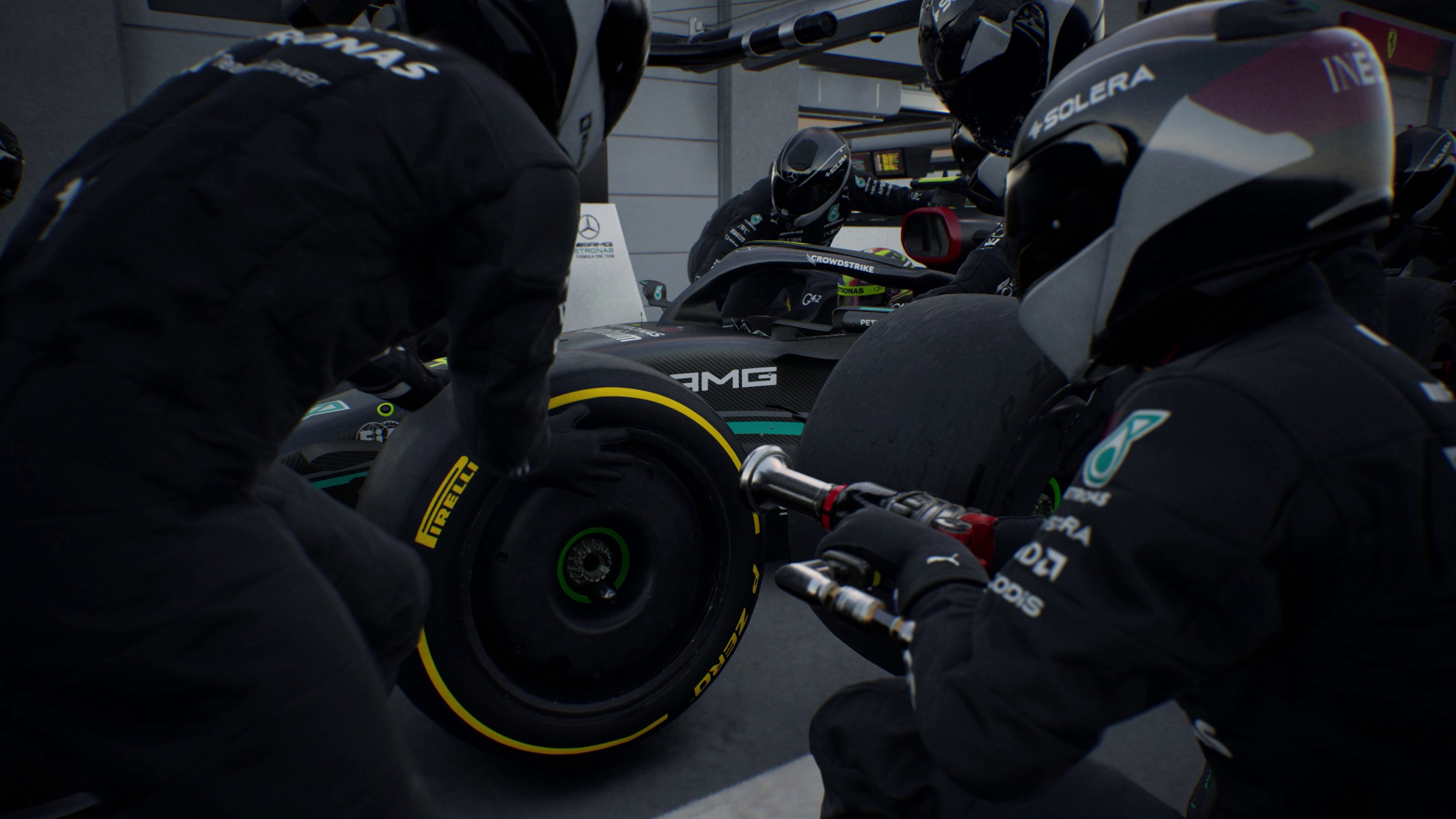
Upon starting a fresh F1 Manager 23 career, your progress begins at the start of the season at your team’s headquarters. It’s effectively your hub of complete control, providing an overview of every aspect of your team in neatly organized tabs. There is some obtuseness to navigate through for new players, however.
For one, the tutorial provided for first-time managers only provides an overview of each section and doesn’t really offer any practical application to how certain decisions will affect the team. You’re told that upgrading car parts is vital but given no recommendations as to what you should be focusing on first. Aside from a brief introduction to each section, you’re mostly left to your own devices to figure things out. This won’t be an issue for seasoned F1 Manager players, but newcomers can have a frustrating start to the season as a result.
Another strange part of the tutorial is that you’re forced to leave your first practice session to the AI, which in turn, leads to suboptimal driver preparation for qualifying and the race itself. I understand that Frontier Developments probably wanted to strike a balance between tutorialization and getting new players stuck in, but as boring as it may be at first, I think some extra guidance and practical advice could go a long way here.
Sign up for breaking news, reviews, opinion, top tech deals, and more.
When you do get to grips with your headquarters, though, you’ll find that you have an acute degree of control over your season. For example, facility and car upgrades take time, and won’t be immediately available for the next Grand Prix. I found a lot of enjoyment in researching the race calendar and planning out which upgrades will be most beneficial ahead of time. Similarly, allocating hours to wind tunnel and MFD testing for new parts meant I could develop an edge over rival teams, who will also be constantly improving their own cars.
What just Verstappened
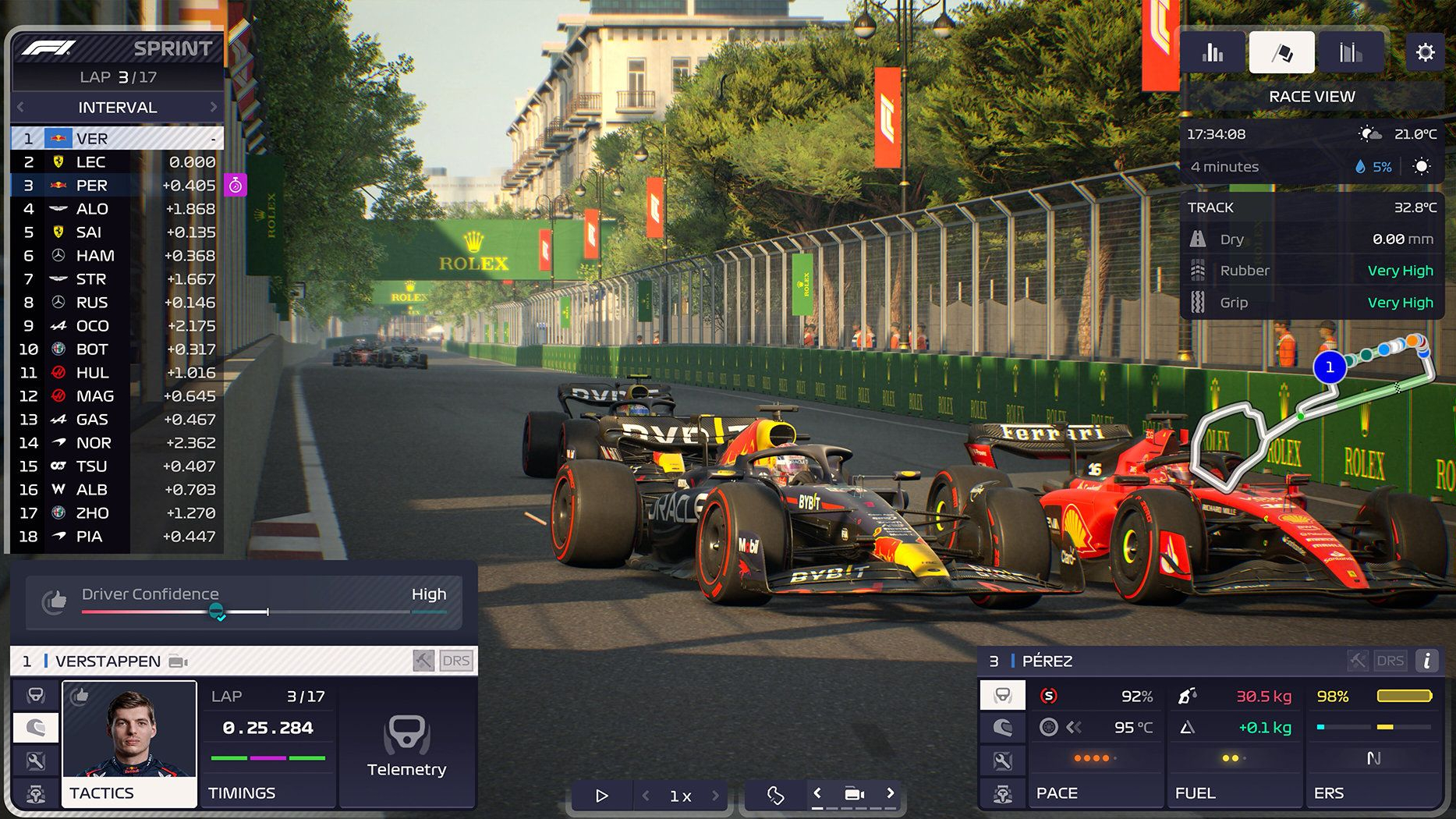
Headquarters management is just one half of F1 Manager 23. The track is where you’ll get to put your careful preparation and hastily-developed upgrades into action. The weekend format follows the real-life F1 season; 23 rounds at circuits across the globe split into practice, qualifying, and race days with some tracks also hosting a shorter sprint race.
You can simulate all of these if you’d like, leaving results up to the AI. However, I strongly recommend managing all of them, even the less-interesting practice sessions. Practice, divided into three one-hour sessions, is where your drivers learn the lay of the land. And there’s a lot of enjoyable strategy to experience here. But if that sounds like a lot of playtime to you, that’s because it is. However, you can elect to speed up time by several increments if you want to get through each session at a quicker clip.
Your two drivers will run their practice plan, and give feedback on how the car feels. Then, between stints, you can make adjustments in the pit lane – via a set of sliders – that’ll help narrow down your cars’ optimal performance. There’s an intricate balancing act to perform here, as moving one slider will affect another.
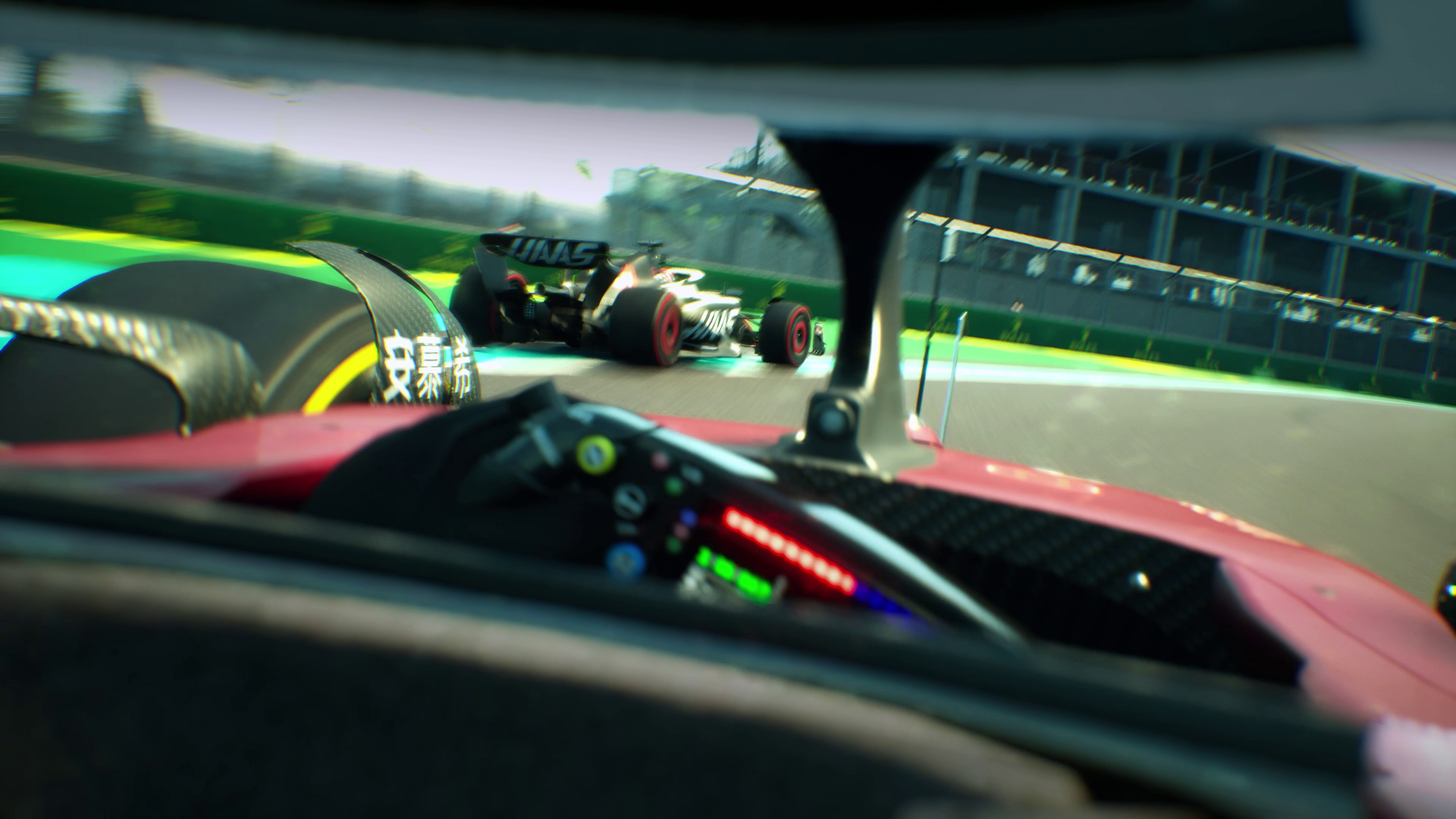
Managing to pull off an optimal practice session pays dividends for the qualifying round, and in turn the race itself. Seeing your carefully laid-out plans come to fruition help F1 Manager 23 feels fantastically rewarding.
A strong practice setup will then govern your chances of qualifying. Much like the real thing, it’s split into three elimination-style rounds, with the ten best drivers finding their place in Q3. The nice thing about qualifying is it’ll automatically set tire and fuel usage to the fastest-possible parameters - though you can manually adjust these if you feel the need.
During the race itself, however, you’ll need to be carefully managing these parameters to ensure a smooth race. For example, putting your tires in Attack mode for too long will run them hot, degrading them faster and increasing the risk of accidents. Setting fuel to Push will make you faster overall, but over-reliance on this means you won’t have enough to finish the race. Lastly, you can also employ your ERS (energy recovery system) which briefly helps to increase pace and make overtaking easier.
Managing these settings for both your cars is a surprisingly intense balancing act, and there’s certainly a learning curve here. In one rather embarrassing example, I’d managed to push Alex Albon into a high points scoring position. But aloof fuel management led to him running out of fuel just before the checkered flag. Trying again by loading a previous save, I got both cars to the end outside of the points but was able to keep the board happy with a consistent performance.
Changing history
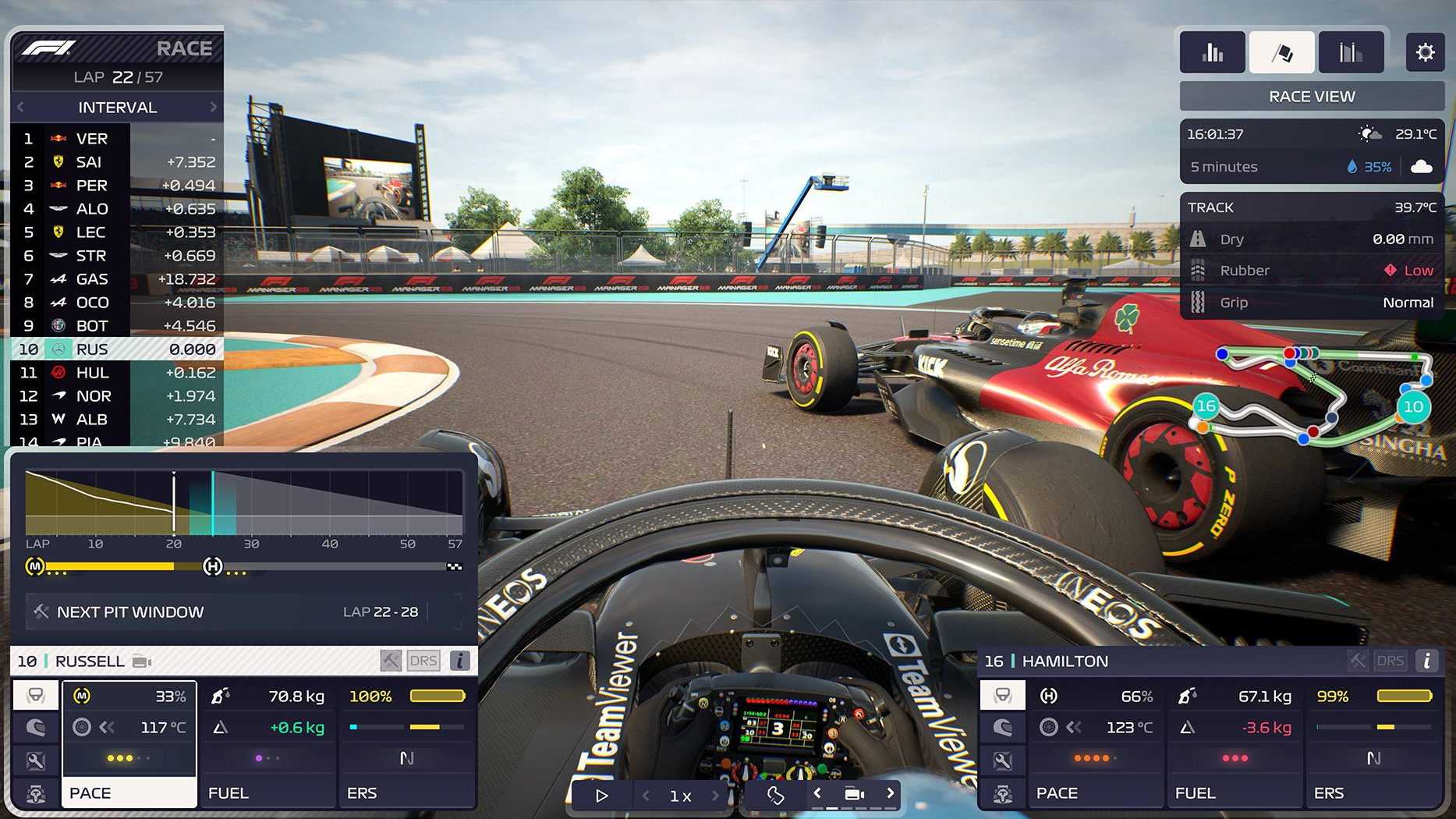
If you haven’t the time for a full race, F1 Manager 23 also provides a selection of optional scenarios for you to challenge yourself with. I found these to be great little distractions that put me in specific situations, helping me to improve various aspects of on-track management one scenario at a time.
First up is Race Replay. This mode, impressively, updates after every real-life F1 Grand Prix, and mimics the results of each. In Race Replay, you can experience each race managing a team of your choice, or select a Race Moment scenario. These are cool in that they highlight a standout moment from the real-world race, and task you with overcoming the effect of it. An example is the moment from the 2023 Silverstone race; as McLaren, you’re tasked with getting both Norris and Piastri on the podium after a safety car incident.
The second optional mode, Exclusive Scenarios, is similar to Race Moments but dialed up a notch. Here’s where you’ll be expected to pull off some truly outstanding results, such as getting both Haas cars on the podium or guiding Ferrari reserve driver Antonio Giovinazzi to a race win at Monza. I found many of these scenarios to be a cut above career mode in terms of difficulty, and make for excellent side content if you really want to flex your managerial muscle.
It’s easy to be frustrated when playing as a backmarker or midfield team in F1 Manager 23, as you’re not going to get solid results right off the bat. Rome wasn’t built in a day, though, and the real beauty of F1 Manager 23 is that you feel you’re constantly working towards improving your team over a long period of time. If you stick with it, and secure your first points, I promise you’ll feel elated. Or alternatively, just pick Red Bull Racing if you want to win absolutely everything.
Accessibility
F1 Manager 23 isn’t flush with accessibility options, but what’s there is appreciated. You’re able to mute background noise during team radio conversations, as well as enable subtitles. There are some robust colorblind options, too, allowing you to change the colors of various user interface modules to be able to parse them more easily.
How we reviewed F1 Manager 23
We played F1 Manager 23 over the course of a week, playing a significant chunk of career mode, both as backmarker Williams and world champions Red Bull, to get a feel for overall difficulty based on the teams chosen. Significant time was also spent in the optional Race Replay and Exclusive Scenario modes to gauge the amount of side content the game has to offer.
After more management? Check out our list of the best PC strategy games available to play right now. Or for something more action-packed, our list of the best racing games provides high-speed thrills for players of all kinds.

Rhys is TRG's Hardware Editor, and has been part of the TechRadar team for over four years. Particularly passionate about high-quality third-party controllers and headsets, Rhys strives to provide easy-to-read, informative coverage on gaming hardware of all kinds. As for the games themselves, Rhys is especially keen on fighting and racing games, as well as soulslikes and RPGs.
